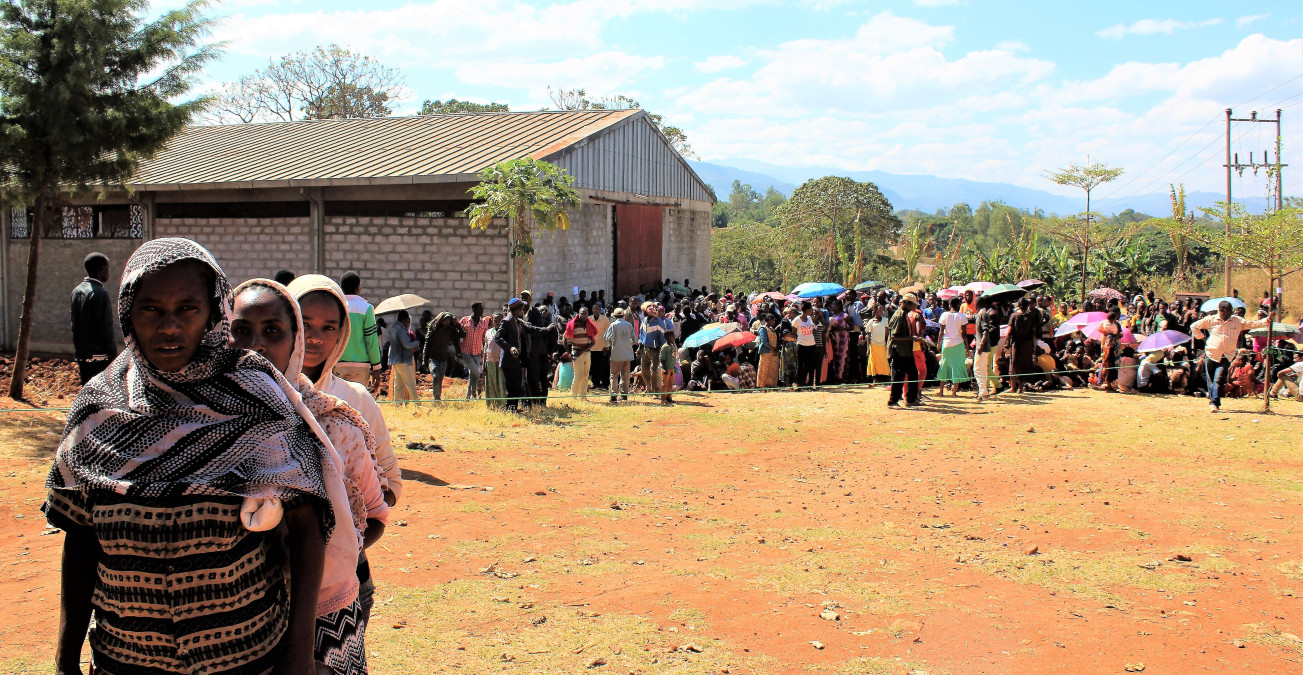“They left us with nothing,” says Fulassa Domo, displaced in Southern Ethiopia
Published: Mar 21, 2019 Reading time: 4 minutes Share: Share an articleThe rough and uneven roads of Dilla meant a slow and difficult journey towards the distribution site, where we would soon come face to face with thousands of internally displaced families. The dust and high temperatures had us grabbing for water, but our discomfort soon seemed trivial. For here, assembled under the scorching sun, they waited. The beneficiaries had beaten us to it. From senior citizens to babies just a few months old, whole communities had travelled to this spot to receive aid kits.

As their voucher numbers were called out, we got to see them up close, their eyes telling a thousand stories. There was no need to ask what hardships they had endured on their route to Dilla. They were etched on their faces for all to see. And although the past few months had clearly taken a physical toll, they carried themselves with unexpected poise and dignity.
In April 2018, thousands of families migrated towards neighbouring towns, seeking refuge from the conflict threatening their lives. Shakiso and Solema are just a few of the many towns these people were forced to flee from.
“We came to this community with almost nothing. We barely had clothes on our backs. They left us with nothing,” says 67-year-old Fulassa Domo, one of the senior beneficiaries. Many of the people here, both young and old, shared similar stories. “Peace and prosperity for my family, that’s my only wish right now,” says 25-year-old, mother-of-one, Romanesh Assefa.
People In Need together with European Union Civil Protection and Humanitarian Aid (ECHO), Lutheran World Relief and the United Nations Office for Project Services (UNOPS) have provided dignity kits to just over two thousand internally displaced families in Dilla – part of the Southern Nations, Nationalities and Peoples Region (SNNPR) in Ethiopia – to be followed by seven thousand more kits in the next few weeks. The kits consist of various hygiene and sanitary items chosen to meet the needs of displaced victims.
“We came bare-handed”
Many of the beneficiaries migrated to their host community with entire families in tow. For Fulassa, that meant twelve kids from his first marriage and five kids from his second. As he relates, the journey was was far from easy: “It took us a full day to get here, between ten and eleven hours by car.” He says they were “forced to leave” because of ethnic tensions.
Being expelled from their homes, some families had no time to prepare for their escape or even grab the most basic of items. “We came to the host community bare-handed. They even tried to take the clothes off our backs,” Fulassa says. With his family foremost in mind, Fulassa made the snap decision to leave as soon as they could, even if that meant leaving everything behind.
While some families were fortunate enough to travel to host destinations in public vehicles, others were not. “We walked here. It took us two days. We didn’t have enough money to come by car,” says pregnant 25-year-old mother-of-two, Tseganesh Tesfaye. “It was tiring, but we managed,” she adds.
“We simply can’t afford to buy the items in the kit”
With the support of the government, most families have been able to stay in dorms or collection centres, relying on local and foreign aid. “I depend solely on aid because I can’t find a job,” says Fulassa. And while others have managed to make a living and rent a home, Fulassa points out that this isn’t easy, with jobs rare and sometimes seasonal.
“I was left with nothing, so I thank God dearly for having been given this,” Fulassa says of the dignity kit he received. “I can use these items for many years to come. I don’t have the money to buy them, so they’re invaluable for me and my family”.
Echoing Fulassa, Romanesh told us she doesn’t have a job, depending on her husband’s income to sustain her and her only child: “We simply can’t afford to buy the items in the kit.” A common refrain heard among so many of the beneficiaries here.
“I think of going back all the time”
Finally, we asked the families if they ever think about returning to their place of origin. “It’s up to God,” says Tseganesh. “If the government says there’s peace, then I’m happy to return.” Fulassa had a different response: “I think of going back all the time. I like Dilla, but Shakiso’s my home. How could I hate it?” he says.
Even 10 months on from the height of the displacement crisis, the situation in the Gedeo zone remains difficult. People in Need together with the European Union Civil Protection and Humanitarian Aid Department (ECHO), UN OCHA, Lutheran World Relief, UNICEF and local authorities such as the Woreda Water Office have worked to renovate water sources, desludge latrines and construct new toilets, while organising the distribution of humanitarian aid, including dignity and shelter kits, to thousands of the most vulnerable people.
After bidding farewell and setting out on our return journey home, we cast a final glance back on what seemed like over two thousand beneficiaries – all carrying kits. And although life goes on, that was reason enough to bring smiles to their and our faces that day.









